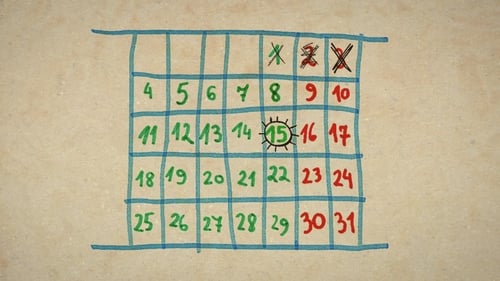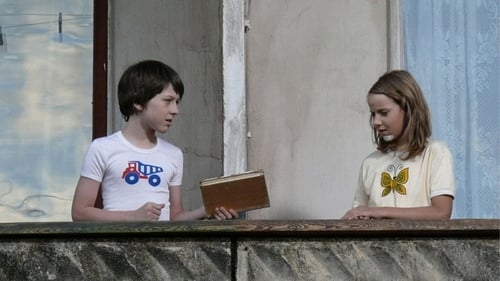
Self
Despite turning 30 this year, there are still some myths and legends about the Faculty of Film and Television yet to be uncovered.

Writer
이자벨레와 루다스는, 또래에 비해 명석하지만, 간질을 앓고 있는 아들 가일루스를 키우고 있다. 이자벨레가 얌전하고 비밀스러우며, 관심에 목마른 여섯 살 소년 일리아를 입양하기로 결정하면서 갈등이 시작된다.

Director
이자벨레와 루다스는, 또래에 비해 명석하지만, 간질을 앓고 있는 아들 가일루스를 키우고 있다. 이자벨레가 얌전하고 비밀스러우며, 관심에 목마른 여섯 살 소년 일리아를 입양하기로 결정하면서 갈등이 시작된다.

Director
Conversations On Serious Topics is a film without exterior action, props, landscapes or special effects. Its main characters are children and teenagers with a special ability to describe the surrounding world. Intimate conversations with them reveal the picture of the modern world -- at times melancholic, at times comical, at times dramatic. Shot in a minimalist fashion, the film raises questions about loneliness, love, God, the world and human relations. "The world is people." "Don't you believe in God? I can teach you how to start believing..."

Producer
Waiting that makes you grow up. Saule (15) and Liucija (6) are two sisters living alone, waiting for their parents who have temporarily gone to London in search of work. The biggest responsibility falls on older Saule's shoulders - she must take care of Liucija, look after home while dealing with the usual issues of a teenager's life. With so much on her plate and the huge stress Saule is unable to fit in with her peers. The girls do their best to live on their own and struggle with reality but sometimes being a grown-up is just too hard.

Director
Soviet eighties. A little town in the periphery. After his parents' divorce, 11-year-old Rolanas and his dad move in next door to same-aged Emilija. Friendship is born between the kids, however, shyness or fear of opening up makes them communicate through the wall, sitting in their own balconies, or through a socket connecting their flats. Emilija's parents also appear to be on the verge of divorce. The children discover common topics, activities. Unfortunately, a nearly tragic accident prevents Emilija to go to the balcony. This encourages both children to set out for a "real" date.

Editor
Vulkanovka is a poor village in Crimean steppe, as local people say, forgotten by God and by people. Nonetheless that place came very much alive when famous Lithuanian film director Sharunas Bartas crew stayed here for almost two years filming Seven Invisible Men. Most of local people helped filmmakers a good deal. But the Grand Cinema left and probably won’t come back. So the life of Vulkanovka returned to its usual routine. But it’s not for everyone. Film director Giedre Beinoriute with her crew came to Vulkanovka nine months later. In her documentary people speak about their “cinematographic” experience with great enthusiasm. They tell about how it was and how it was different from their earlier understanding about filmmaking. Different moods and people’s openness in the film are interwoven into daily life of Vulkanovka with its rituals of caws’ feeding, shopping in the only shop “Produkty”, collecting metal and other.

Writer
Vulkanovka is a poor village in Crimean steppe, as local people say, forgotten by God and by people. Nonetheless that place came very much alive when famous Lithuanian film director Sharunas Bartas crew stayed here for almost two years filming Seven Invisible Men. Most of local people helped filmmakers a good deal. But the Grand Cinema left and probably won’t come back. So the life of Vulkanovka returned to its usual routine. But it’s not for everyone. Film director Giedre Beinoriute with her crew came to Vulkanovka nine months later. In her documentary people speak about their “cinematographic” experience with great enthusiasm. They tell about how it was and how it was different from their earlier understanding about filmmaking. Different moods and people’s openness in the film are interwoven into daily life of Vulkanovka with its rituals of caws’ feeding, shopping in the only shop “Produkty”, collecting metal and other.

Director
Vulkanovka is a poor village in Crimean steppe, as local people say, forgotten by God and by people. Nonetheless that place came very much alive when famous Lithuanian film director Sharunas Bartas crew stayed here for almost two years filming Seven Invisible Men. Most of local people helped filmmakers a good deal. But the Grand Cinema left and probably won’t come back. So the life of Vulkanovka returned to its usual routine. But it’s not for everyone. Film director Giedre Beinoriute with her crew came to Vulkanovka nine months later. In her documentary people speak about their “cinematographic” experience with great enthusiasm. They tell about how it was and how it was different from their earlier understanding about filmmaking. Different moods and people’s openness in the film are interwoven into daily life of Vulkanovka with its rituals of caws’ feeding, shopping in the only shop “Produkty”, collecting metal and other.

Editor
The documentary reveals the relationship between Vilnius public transport ticket inspectors and freeride passengers and at the same time it comments on our own daily rut, unfulfilled dreams and desire of a better life.

Writer
The documentary reveals the relationship between Vilnius public transport ticket inspectors and freeride passengers and at the same time it comments on our own daily rut, unfulfilled dreams and desire of a better life.

Director
The documentary reveals the relationship between Vilnius public transport ticket inspectors and freeride passengers and at the same time it comments on our own daily rut, unfulfilled dreams and desire of a better life.

Director
Animated documentary telling the story of director's grandparents who were exiled to Siberia during the Soviet era.











